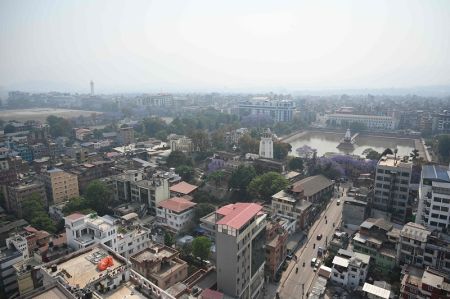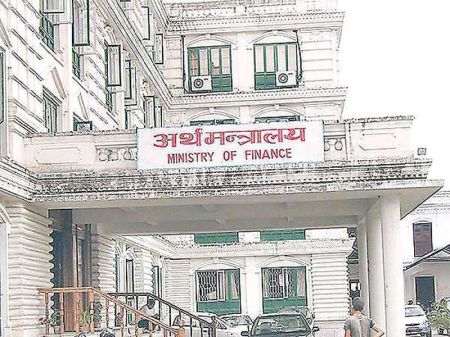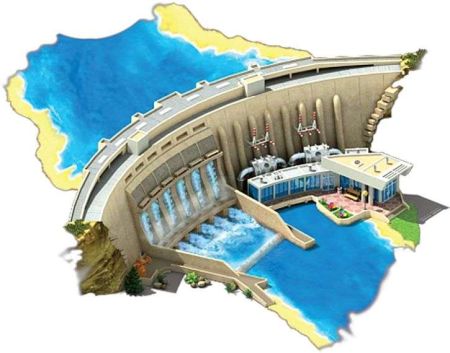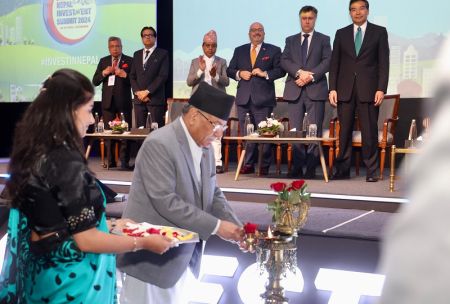“Employment opportunities are fundamental for the development of the country”
.jpg) |
| Hari Bhakta Sharma Vice President, CNI |
The first priority should obviously be peace and constitution. These phrases have, however, been quite rhetorical. Now other development activities should also go hand in hand with the agenda of peace and constitution. These are some priority areas identified by the CNI. First, the problem of load shedding that has taken its toll on the country should be addressed. Entrepreneurship has been significantly reduced due to power outage. Entire personal, social and professional life has been affected by power outage and all political parties have pledged to end this crisis in five years. We hope, they will translate their commitments into reality. They need to come up with concrete plans to attract more investment in the energy sector from the business community. It is time the government starts working towards addressing power crisis at an emergency level.
Second, the government should foster environment conducive for entrepreneurship. The new government should identify major bottlenecks in this regard and try to address them. We want the new government to endorse Industrial Entreprise Act without any further delay and putting an end to the dilly-dallying at the policy level.
Third, Nepal has been failing to take advantage of its World Trade Organization (WTO) membership. The new government should make serious effort to take advantage from the WTO provisions. Some laws including anti-dumping should be introduced at the earliest.
Fourth, the government should prioritize special areas. For instance, if it wants development from hotel and tourism sector it should be ready to develop essential infrastructure. The government and the private sector can go hand in hand to accelerate tourism business but it is the government, which should come up with clear policies to enhance the sector.
And, employment opportunities are fundamental for the development of the country. Political parties have expressed their commitment in their manifesto to create employment opportunities and they need to fulfil their commitment. The government should ensure good governance, which is very essential for the development of all sectors in the country. It should have tangible objectives to address the problems faced by the country since long.
We ask the government to declare the coming decade as the “Decade for the Development” and focus all its efforts to uplift country’s overall development indicators. Let us fix the target of per capita income at 4 thousand dollar in 10 years from now and work to achieve that target. This kind of positive target creates positive vibes, which is very essential for the development.
“Please, sincerely implement your own manifesto”
(1).jpg) |
| Pradeep Jung Pandey Vice President (Commodity), FNCCI |
New government, which is expected to form in few days, should respect peoples’ mandate and trust. The parties that form the government need not do much other than sincere and genuine implementation of their own manifestos. All major parties have in the manifestos vowed to address concerns raised by private sector before election. We hope, they will not backtrack from their own commitments.
All political parties have acknowledged that country’s economy has been suffering from various challenges including power deficit, unemployment, trade deficit, low investment and like that. They have promised to take initiative to end all these economic woes. So, it is both their duty and responsibility to address all these economic concerns. Political parties should brush aside their personal interests and unite for the betterment of the country.
The new government should initiate the process of endorsing various laws. First of all, it should effectively implement the Industrial Policy, which was developed some three years ago. Industrial Enterprise Act in line with this Policy is a must to foster industrial climate. Similarly, the government should initiate the formulation of new laws or replace existing ones such as competition promotion law, chamber law and the like. Similarly, cartel and syndicate are not acceptable to the business community and the government should ensure that there are stringent provisions against them.
The new government should pledge to remove all bureaucratic hurdles. Private sector wants government’s facilitation in crucial areas like the hydropower sector. The government should bring one-window policy to attract more investment in the hydropower sector. Presently, investors have to face hurdles at multiple levels, which is not favourable environment for investment. In my personal view, the new government needs to decentralize its development activities. It should bring policies encouraging micro enterprises. Women should also be encouraged to engage in business. Through concerted effort and collective we can take this country to another level of development.
“The new government should facilitate the process of forming common economic agenda”
.jpg) |
| Bhawani Rana Vice President (Industry Commerce), FNCCI |
Political parties should agree on common economic agenda and the new government should facilitate the process of forming common economic agenda. The new government should also show positive attitude towards private sector. Nepal’s private sector is committed for development and prosperity. For instance, private sector has started some big projects like construction of Fast Track Road. The government should acknowledge the initiatives by private sector and encourage for more investment and involvement in development process.
End of the existing power woes is common agenda of the business community. Besides, the government should take initiation to introduce investment-friendly policies.
The new government should be action-oriented rather than talkative only. It should put sincere effort to address the demands put forth by the private sector. Another important aspect is that the new government should ensure security of the industries. It should ensure that all production units in the country are safe and are protected by the government.
The political parties have expressed their commitment to translate their commitments made during the election time. We hope they will not forget their promises after the election.
As far as law amendment is concerned, the government should bring investment friendly policies to stimulate investment in the country. Similarly, our industrial policy is not very clear. The new government should proceed to make it comprehensive and clear. Despite some changes and government’s positive cooperation, Foreign Direct Investment (FDI) policy is yet to be precious. The government needs to revise it too.
Investors have been waiting for an environment conducive for the investment in the country. We can lure more investment if the government can ensure that there is no labour dispute and there is policy stability. The government should ensure foreign investors that their investment is secured in the country though bilateral agreements like BiPPA.
“Strong and self-reliant economy for country’s reputation”
.jpg) |
| Manoj Kedia Vice President, CNI |
Now that the Constituent Assembly elections are over, how do you visualize the business scenario in the days ahead?
Democracy has to be institutionalised. Political issues have been settled and that marked the crossing of transitional politics. The rhetoric of transition politics should not be repeated and we should be optimistic of economic growth in the days ahead. Kedia Group is very hopeful of contributing to the overall development of the country.
During the last half-decade, there have been many positive changes in the political regime. With the successful completion of second Constituent Assembly election, it’s time to focus on institutionalising the achievements.
Now, political parties should prioritize national interests by brushing aside their partisan and personal interests and focus on formulating collective goals to achieve national economic growth.
It’s an achievement for the private sector that almost all major political parties consider it as the backbone of the national economy. Unity in diversity is our speciality and Nepali leaders should translate this mantra into reality. They should prioritize economic prosperity in their political agenda. Nepali business won’t get good reputation in international market unless our economy is strong and self-reliant. It is possible and all we need is sincere commitment from our politicians.
What agenda would you like the upcoming government to focus on for the progress of business-economic field?
The government should show readiness to address some pending economic agenda. It should create environment whereby industries can be set up in every district. Local bodies should be given authority for deciding utilization of local resources. The central government should act as intermediary to mitigate problems faced by the private sector at the local level.
Above all, state should ensure political stability and strong governance and ensure their commitment made to the general public in the last election of drafting and promulgating the new constitution within the promised time frame. Economic growth of the nation can sustain and progress only if the state and political actors act as strong catalyst and continue propelling it.
“The government should provide cash incentive to parties based on the number of votes”
.jpg) |
| Pashupati Murarka Vice President (Associate), FNCCI |
The new government needs to make its presence felt around the country. In the past, business community was terrorized due to ‘forceful donation’ drive and labour problems instigated by political parties. This situation should not continue.
Even today, power developers face many hurdles at the local level during the construction process and while carrying out other activities. The government should intervene in such situations to stop it from going chaotic. In my opinion, the government should show its presence at the local level to end such situation.
Similarly, the new government should immediately start the process to reform a number of important laws and regulations. The business environment is a matrix of policy, legal, institutional and regulatory conditions. The new government should immediately start the process of passing essential laws, which were dumped in the first Constituent Assembly. The Industrial Enterprises Act, Social Practices (Reform) Act, Company Act and Labour Act along with other essential bills are pending in the parliament for a long time.
We also want the new government to focus on drafting the new constitution. The culture of blaming transition politics for every failure should end. People should not be deprived from getting the benefits of progress and development just in the name of transition.
The entire business fraternity expects that the nation will get a stable government. We have received 20 different governments in the last 20 years. Changes in the government
will automatically affect
the economy.
Last but not least, I want the new government to introduce the policy of government grants to political parties on the basis of the votes the parties garner in the election. This will help in ending donation-seeking trend among the political parties during elections. Donations have brought many maladies and implementing such provision will help in ending malpractices.
“The government should bring laws to curb financial crimes”
.jpg) |
| Nirmal Pradhan Share Investor |
The new government, which will be formed in a few days, should be confident and bold to control financial crimes. Consecutive governments have been failing to curb financial crimes creating more space for fraudsters. People’s trust on banking system has declined due to unethical activities of a few businessmen. In my opinion, incidents of financial crimes flourished due to the government’s inefficiency. The government became mute spectator and did nothing to end flourishing financial crimes. NRB may have its own limitations, but it does not justify such lawless situation. Criminals’ moral gets boosted if the country treats criminals and innocent alike. Thus the government should bring laws to curb financial crimes and should dare to close business of any firm if found committing financial crimes. Share market will automatically boost if the government can create environment of trust among general public forbanking and financial institutions (BFIs). The share market has already started witnessing bullish trend and it will continue, if there is political stability in the country.
Constitution: The Only Priority
.jpg) |
| Rajan Singh Bhandari President, Nepal Bankers’ Association |
Constitution is our first, second and third priority. Banking sector is eagerly waiting new constitution, as it will help in ending political transition. Constitution will foster environment favorable for grooming political consensus. Banking sector will automatically take new life if there is stability in the political arena.
“The new government has to make policies based on our local specifics”
.jpg) |
| Krishna Paudel Agriculture Activist |
The new government is responsible for the promulgation of a new constitution. After the 2062/63 movement, the state is going through a crisis and the state has tried to improve the situation by conducting elections for the social and economic development of the nation.
Agriculture Development Strategy (ADS) paper has been prepared. The new government has to adopt it and reform policies, acts and laws so that the agricultural sector can grow. It can be one of the things that we can expect from the upcoming government. For the past few years the situation of agriculture has worsened faster than ever. We depend on all types of imported food to meet our consumption demand.
The nature of agriculture is totally different from what we have been thinking and it should definitely be different because our topography, ecology and geography are different from other countries. As such, the upcoming government firstly has to review the agriculture policies very minutely and formulate policies relevant to the present context. Our agriculture has developed through the domestication of wild plants. This is the work of the department of agriculture research. However, it is sad that no such research is carried out in the agriculture sector.
The upcoming government has to focus on three aspects to uplift the agricultural sector. Firstly, it has to make policies based on the long-term agriculture model, our local specialty and the farmers’ capability. However, our agricultural model should not be of a competitive one. Secondly, we should remember that 70 per cent of the population is farmers. This means that 70 per cent of the people are getting food to eat to their fill. If the remaining 30 per cent should be made capable afford buying the imported products for consumption. Our strategy has to be two-pronged agriculture for sustenance and agriculture for comparative advantage. Thirdly, the model we are adopting must be different from the ones adopted by other countries across the world.
“A market does not operate without consumers”
.jpg) |
| Jyoti Baniya Consumer Rights Activist |
All the commodities and the facilities in the market are for the sake of consumers. A market does not operate without consumers.
The government‘s duty is to look from both perspectives: the manufacturer and the consumer’s. The duty of the government is to protect the rights of both producers and the consumers. It must be able to create a clean market and ensure that consumer’s rights are not violated. In order to create a clean market, the government must come up with different market regulation activities.
At present, the government is unable to create effective market regulation policies in favour of both consumers and producers. Although few laws and rules have been made, they are not effectively implemented.
Nepal government has remained passive in protecting consumer’s rights. There are many actions, which the government can take in favour of consumers. Firstly, the government must establish a separate consumer court. Secondly, effective market regulation mechanism must be developed in order to build a clean market for consumers. Thirdly, consumer rights protection policy should be formulated to help the consumers.
There are many consumer rights protecting activities that the government is yet to initiate. First priority is to pass consumer rights protection law. Consumer protection forum has submitted the final draft to the government but it is still not made into a law.
In order to ensure consumer rights protection, the government must establish separate department for supply management, which should also be entrusted the duty to formulate and implement supply policy. Similarly, consumer courts and consumer protection fund must be set up in every district. These proposed departments should be responsible for implementing all regulatory activities and must be equipped with separate food inspector, quality inspector and inspector for measurements and weights. Along with that they should be also checking the standard of food products and ensure that the market is operating in a clean manner.
Also important is consumer awareness. A clean and safe market cannot be created without making the consumers aware of their rights. Thus, to raise awareness among the consumers of their rights, informative campaigns should be launched in urban as well as rural areas.
“Many laws need change to encourage entrepreneurship”
.jpg) |
| Bharat Raj Upreti Former Justice Supreme Court of Nepal |
How do you view the current legal provisions to govern entrepreneurship?
Our legal provisions governing entrepreneurship are guided by the philosophy to have government’s control over enterprises rather than developing and promoting entrepreneurship. We talk about economic liberalisation and market driven economy, but our policies have never opened up for economic liberalisation and to facilitate economic development. Our laws were formed with a motive to curtail entrepreneurship. Ifpresent Industrial Enterprise Act, Company Act, Bankruptcy Act, Foreign Investment Act and Nepal Rastra Bank’s (NRB) directives on blacklisting are seen in totality, it is evident that they do not encourage entrepreneurship, instead establish government’s role as a dominator rather than a facilitator.
People are not in a situation to predict the verdict of the legal system. This is because our courts too are not tuned accordingly. They have not developed the capacity to comprehend and interpret commercial and entrepreneurship laws. Predictability is very important. To develop entrepreneurship, one must be sure that his/her rights are protected, one’s contract is given validity and the company’s operation will not be unnecessarily barred. Similarly, bureaucracy, the law implementing body, too is not tuned to work as a facilitator. They still have the sense of being rulers and perceive entrepreneurs as demanders and themselves as fulfillers of demands.
A new government with fresh mandate is on the scene. What laws should it formulate to promote socially responsible enterprises?
If the upcoming government is really committed to develop entrepreneurship and economic development, first and foremost, problems and hindrances to entrepreneurship must be identified. Such obstacles and bottlenecks could be legal, policy-related or court related or bureaucratic. Once diagnosed, corresponding solutions can be recommended.
We still don’t have culture of maintaining transparency and of seeking feedback from the general public while formulating rules and regulations. We do not seek suggestions, feedback and discuss related issues with stakeholders for whom those policies and regulations are formulated. A single person belonging to an association or
federation cannot represent the whole
of general public.
Access to capital is the basic foundation of developing entrepreneurship. How can this be ensured through legal provisions?
Access to capital is related to policy. To ensure this, appropriate capital instruments must be designed. And,such instruments should not cheat people. Access to capital comes along with protection of capital of the general public. Firstly, to develop new financial products, the NRB Act must be amended along with the Banking and Financial Institutions Act. Similarly, all laws related to capital market must be reviewed to increase the access to capital. Instruments like venture capitals are easier said than implemented. American and European economies have failed because of it and we should identify what went wrong and learn lessons from them and act accordingly that best suit our situation.
‘‘Need for Policy reform to enhance trade and export ’’
.jpg) |
| Bharat Raj Upreti Former Justice Supreme Court of Nepal |
What should the new government do to raise the Nepali market to international level?
Over the past 10 years Nepal has done a lot to promote its trade. Nepal became the World Trade Organization (WTO) member and also qualified as one of the beneficiaries of European Union’s Generalised System of Preferences (GSP). This has created immense opportunity for Nepali products in the global market. However, exporters are not benefitting from these opportunities because of the prevailing supply side constraints such as poor transit facility, lack of proper infrastructures (power, road network), political instability and corruption. This is linked with the current policies that are hindering the export growth of the country thus adversely affecting market competitiveness.
I think that Nepal won’t be able to achieve higher export growth until and unless we develop our trade capabilities. For this, the new government should endorse investment friendly policies on the first hand. The policy reform should be carried out in such a way that it enhances the trade and export capabilities of the nation.
How can Nepal boost its export potential?
We need to be more selective in terms of capacity enhancement to boost export. This will help to increase productive capacity in key sectors. These products should be developed along the value chain. Similarly, there is also a need to explore new products that could be of comparative advantage to Nepal. Nepal can take good benefit from financial services, IT sector, tourism and hospitality along with the health sector.
The new government should create conducive national policy. An agreement for a common minimum programme (CMP) among the major political parties is likely to be helpful for this. The CMP would ensure not to derail the process even in an event of political change in the country.
Why aren’t Nepali products with comparative advantage faring good in terms of competitiveness in the global market?
Producing and exporting in large quantities is not enough to satisfy the foreign buyers. We need to maintain the quality of the products and focus on the value added products. Nepal’s transit system is also a bottleneck for export growth. Speedy border mechanism is very important to boost export. I suggest the new government to simplify the current transit policy to streamline the cross-border trade. Lengthy transit procedures increase cost of doing business with other countries. So, the new government should also device an effective transit policy to decrease cost.
The sector-wise approach (SWAp) in the trade sector has not been implemented as planned. How can the new government implement trade SWAp in an effective way?
The government should develop new mechanism for the effective implementation of trade SWAP concept. Strong coordination between the concerned ministries and stakeholders is required. Similarly, harmonization of industrial and agricultural policies is needed.
Nepal is not seen benefitting from duty-free and quota-free market access given by the developed countries to the LDCs. What can be done to grasp this opportunity?
As I said earlier, this particular topic is linked to the country’s export. The upcoming government should introduce new policies and strengthen current ones focusing on developing Nepal’s trade competitiveness and capacity enhancements. Non-tariff barriers and supply side constraints need to be removed.





















